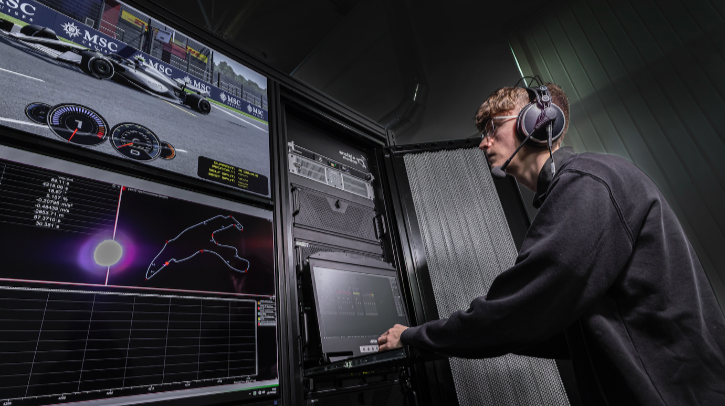Ansible Motion has announced its Theta Cube Sport driver-in-the-loop (DIL) simulator, developed for motorsports and reportedly bringing the realism of large, permanently installed systems into a self-contained, transportable and turnkey package to enable engineering-class DIL simulation in a compact, self-contained system.
The reveal marks the launch of Ansible Motion’s Sport DIL simulator product line, which spans its Delta, Sigma and Theta driving simulator series.
Dan Clark, Ansible Motion’s managing director, commented, “Theta Cube Sport is a leap forward for compact, transportable motorsport simulators. It delivers a comprehensive, engineering-class DIL experience in a lightweight, fully enclosed form factor that’s quick to install, operate and connect to external simulation environments. With compatibility across our multi-sim ecosystem and support for full vehicle and driver immersion systems, it offers motorsport customers a unique, engineering-grade, futureproof solution.”
All-new design
The Theta Cube Sport is a ground-up reimagining of Ansible Motion’s Theta Cube DIL simulator, delivering a transportable, 2.5m3 self-contained virtual test-driving solution. It offers seamless integration with Ansible Motion’s software, visual, audio and loading systems, plus connectivity with external software-in-the-loop (SIL) and hardware-in-the-loop (HIL) systems.
Despite its compact footprint, it offers a full suite of sensory feedback and immersion systems, including a reconfigurable race car cockpit and dash environment, with an adjustable racing seat, pedals and multi-function steering wheel, which can be made bespoke or delivered from standard options.
The simulator weighs 800kg (300kg lighter than the standard Theta Cube) and requires four single-phase power connections. An integrated mini operator station with a spectator screen, supplementary support and live data monitoring can be accessed by an operator, or the entire system can be operated by the driver within it.
The solution features a scalable, cross-compatible driver-surround cassette shared with the Theta Seat Sport, and supports integration with Ansible Motion’s immersion systems. Alongside haptic and torque feedback for the steering, the optional Ansible Motion Seat Belt Loading System (AML SBLS) and optional Helmet Loading System (AML HLS) deliver longitudinal acceleration cueing and split left/right cueing.
Uninterrupted driver immersion
By replicating the full spectrum of sensory inputs – from what the driver sees and hears to what they feel through the steering, pedals and seat – Theta Cube Sport creates a natural, convincing environment where realistic virtual test-driving sessions can occur.
Its enclosed environment includes a 180° multi-projection vision system, high-performance image generation with Nvidia RTX 4090 GPUs and engineering-grade graphics from rFpro. Integrated haptic and torque feedback systems, including Ansible Motion’s steering (AML HWLS), pedal (AML PLS) and haptic actuator (AML HFA) technologies, provide realistic tactile input. A full audio system supports simulation sounds and driver communication. The simulator is fully compatible with Ansible Motion’s multi-simulator ecosystem, enabling connected multi-driver, multi-vehicle sessions for advanced race and vehicle development.
Ansible Motion’s compact in-cabin Data Acquisition Unit (AML DAQ) supports multichannel analog and digital I/O, with open ports for customer systems. Its Distributed Data Bus (AML DDB) enables real-time, synchronous co-simulation across all hardware and software platforms, including external tools. Users can integrate preferred data acquisition systems or use Ansible Motion’s recommended applications for data streaming, analysis and logging.
In related news, Synopsis unveils digital twin CFD experience with Nvidia Omniverse


